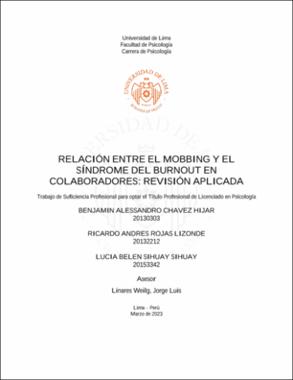Mostrar el registro sencillo del ítem
Relación entre el mobbing y el síndrome del Burnout en colaboradores: revisión aplicada
| dc.contributor.advisor | Linares Weilg, Jorge Luis | |
| dc.contributor.author | Sihuay Sihuay, Lucia Belen | |
| dc.contributor.author | Chavez Hijar, Benjamin Alessandro | |
| dc.contributor.author | Rojas Lizonde, Ricardo Andres | |
| dc.date.accessioned | 2023-05-22T20:11:43Z | |
| dc.date.available | 2023-05-22T20:11:43Z | |
| dc.date.issued | 2023 | |
| dc.identifier.citation | Chavez Hijar, B. A., Rojas Lizonde, R. A. & Sihuay Sihuay, L. B. (2023). Relación entre el mobbing y el síndrome del Burnout en colaboradores: revisión aplicada [Trabajo de suficiencia profesional para optar el Título Profesional de Licenciado en Psicología, Universidad de Lima]. Repositorio institucional de la Universidad de Lima. https://hdl.handle.net/20.500.12724/18261 | es_PE |
| dc.identifier.uri | https://hdl.handle.net/20.500.12724/18261 | |
| dc.description.abstract | Mobbing directly affects the performance, motivation and well-being of employees, generating economic and productivity losses. The objective of this work is to identify the relationship between mobbing and Burnout syndrome. For this, a systematic search, review and analysis of research articles from psychology journals was carried out and in accordance with the required criteria of the PRISMA guide. The information was obtained from the Web of Science and Scopus databases, of which ten were selected for the analysis of the works that investigated mobbing and Burnout syndrome. The methodology of the selected studies was descriptive-correlational, quantitative and cross-sectional. It was possible to observe that in the presence of mobbing there is a greater probability of developing Burnout syndrome. In conclusion, a statistically significant relationship is observed between mobbing and Burnout syndrome, which answers the research question posed. It is recommended that future research should be of a longitudinal design to obtain results for an evolutionary perspective and be investigated from a qualitative approach to diversify information, applicable to practice in the organizational field. | en_EN |
| dc.description.abstract | El mobbing afecta directamente al rendimiento, motivación y bienestar de los colaboradores, generando pérdidas económicas y de productividad. El objetivo de este trabajo es identificar la relación entre el mobbing y el síndrome de Burnout. Para ello, se realizó una búsqueda sistemática, revisión y análisis de artículos de investigación de revistas de psicología y acorde con los criterios requeridos de la guía PRISMA. La información se obtuvo a partir de las bases de datos Web of Science y Scopus, de las cuales se seleccionaron diez para el análisis de los trabajos que investigaban el mobbing y el síndrome de Burnout. La metodología de los estudios seleccionados fue de nivel descriptivo-correlacional, de enfoque cuantitativo y corte transversal. Se pudo observar que ante la presencia de mobbing hay una mayor probabilidad de desarrollar el síndrome de Burnout. En conclusión, se observa una relación estadísticamente significativa entre el mobbing y el síndrome de Burnout, lo cual responde a la pregunta de investigación planteada. Se recomienda que investigaciones futuras sean de diseño longitudinal para obtener resultados con una perspectiva evolutiva y se aborde desde un enfoque cualitativo para diversificar información, aplicable a la práctica en el ámbito organizacional. | es_PE |
| dc.format | application/pdf | |
| dc.language.iso | spa | |
| dc.publisher | Universidad de Lima | |
| dc.rights | info:eu-repo/semantics/openAccess | * |
| dc.rights.uri | https://creativecommons.org/licenses/by-nc-sa/4.0/ | * |
| dc.source | Repositorio Institucional - Ulima | es_PE |
| dc.source | Universidad de Lima | es_PE |
| dc.subject | Acoso moral en el trabajo | es_PE |
| dc.subject | Síndrome de burnout | es_PE |
| dc.subject | Revisión bibliográfica | es_PE |
| dc.subject | Bullying in the workplace | en_EN |
| dc.subject | Burn out (Psychology) | en_EN |
| dc.subject | Bibliographical revision | en_EN |
| dc.title | Relación entre el mobbing y el síndrome del Burnout en colaboradores: revisión aplicada | es_PE |
| dc.title.alternative | Relationship between mobbing and Burnout syndrome in workers: An applied review | en_EN |
| dc.type | info:eu-repo/semantics/bachelorThesis | |
| thesis.degree.level | Título Profesional | es_PE |
| thesis.degree.discipline | Psicología | es_PE |
| thesis.degree.grantor | Universidad de Lima. Facultad de Psicología | es_PE |
| dc.publisher.country | PE | |
| dc.type.other | Trabajo de suficiencia profesional | |
| thesis.degree.name | Licenciado en Psicología | es_PE |
| renati.advisor.orcid | https://orcid.org/0000-0003-2570-4701 | |
| renati.discipline | 313016 | |
| renati.author.dni | 75694608 | |
| renati.author.dni | 71240561 | |
| renati.author.dni | 72916085 | |
| renati.level | https://purl.org/pe-repo/renati/level#tituloProfesional | * |
| renati.advisor.dni | 9582184 | |
| renati.juror | Esaine Suárez, Luis Alberto | |
| renati.juror | Gago Martínez, Angélica | |
| renati.juror | Prieto Molinari, Diego Eduardo | |
| renati.type | https://purl.org/pe-repo/renati/type#trabajoDeSuficienciaProfesional | * |
| dc.subject.ocde | https://purl.org/pe-repo/ocde/ford#5.01.00 | |
| ulima.cat | 015 |






